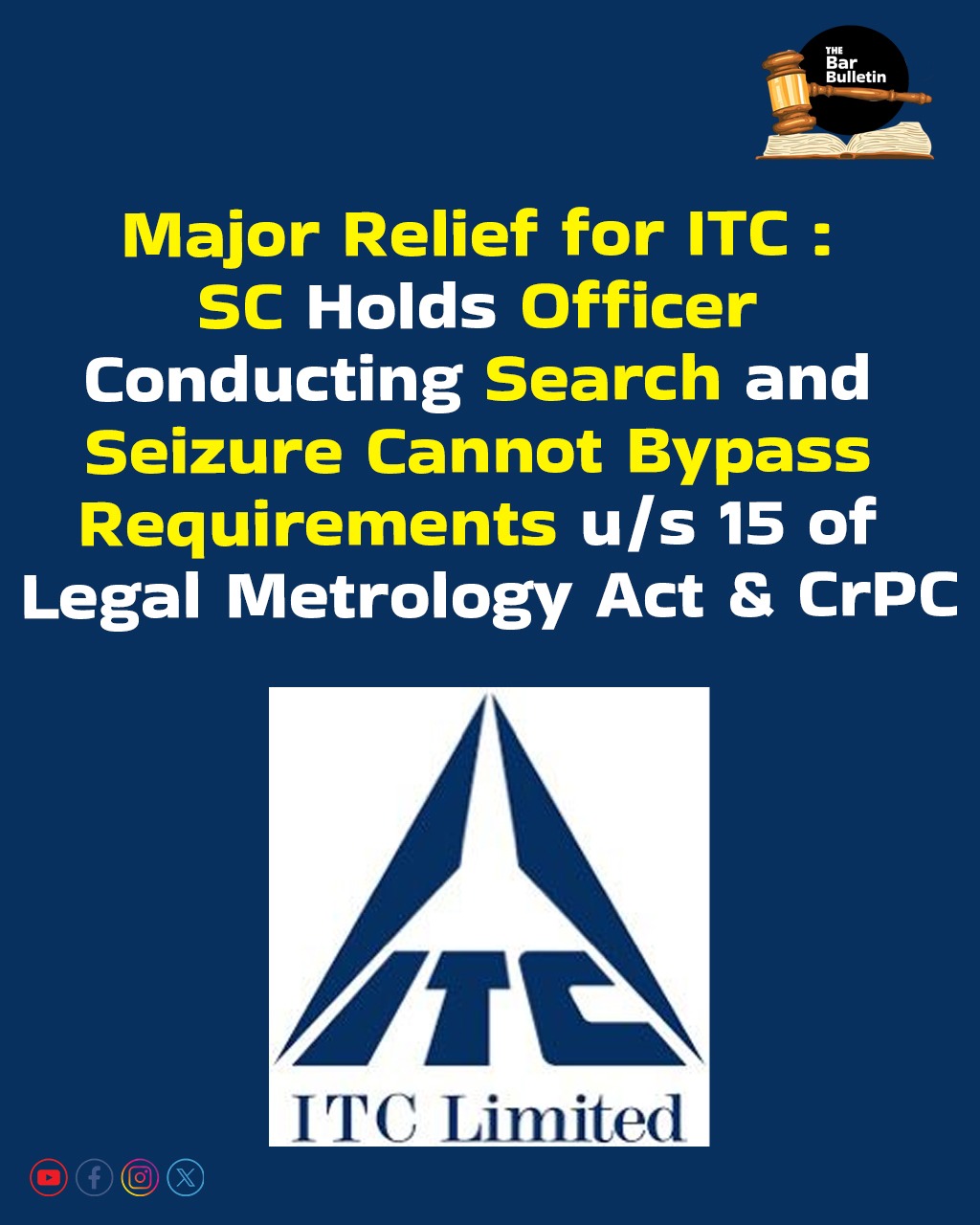While granting relief to ITC, the Supreme Court quashes the seizure and compounding notices issued by the concerned officer in complete disregard of the mandatory safeguards prescribed under Section 15 of the Legal Metrology Act, 2009, and Sections 165, 100(4), and 100(5) of the CrPC. Highlighting that compliance with statutory procedures, including recording “reasons to believe” before initiating search or seizure, is incumbent upon officials, and that non-compliance renders the action futile, the Apex Court ruled that a search & seizure in the absence of a warrant is not justified.
The Two Judge Bench comprising Justice J B Pardiwala and Justice R Mahadevan observed that merely because a place is open at the time of visit does not mean that the requirements under Section 15 of the 2009 Act, or the CrPC can be bypassed, and any officer intending to conduct a search or inspection and effect a seizure, cannot forcibly enter premises without a warrant or reasons duly recorded.
Speaking for the Bench, Justice R. Mahadevan noted that the respondent authorities conducted a search and inspection during business hours at a commercial warehouse belonging to the appellant and seized 7,600 pre-packed wholesale packages of exercise books, for alleged violations of Rule 24(a) of the Legal Metrology (Packaged Commodities) Rules, 2011 and Section 36(1) of the 2009 Act. Since the search was conducted without a warrant, and no reasons were admittedly recorded either for conducting the search or inspection, or for seizure of goods, the Bench held that the search and seizure are clearly vitiated by procedural violations.
Emphasizing that a rational nexus must exist between the articles seized and the contemplated violation under the applicable provisions, the Bench referred to Section 15(1) of the 2009 Act, to observe that there must be reasons to believe both for conducting a search or inspection of premises and for seizure of materials therefrom, and to satisfy the requirements of Section 15, the officials must also comply with the provisions of the CrPC relating to search and seizure.
As far as the opinion of the Division Bench of the High Court that Section 100 CrPC would apply only in respect of closed premises, and since the business premises were open, the pre-requisites under Section 100 CrPC were not required to be followed, the Bench made a reference to the definition of the term “premises” under Section 2(n) of the 2009 Act to observe that it includes not only a place where goods are traded or manufactured but also where they are stored.
The Bench therefore emphasized that the definition of “premises” and the phrase “intended to take place” reinforce that the procedure prescribed under the CrPC must be followed even with respect to goods stored in warehouses or godowns, irrespective of whether open or closed. The Bench also added that Section 93(1)(c) of CrPC uses the expression “search or inspect”, thereby signifying that a warrant is mandatory for both search and inspection, and that the Court must record reasons to believe the necessity of issuing such a warrant.
Briefly, the appellant, ITC Limited, is engaged in the business of stationery items under its brand ‘Classmate’. On a fateful day, the Second Respondent, acting under Section 15 of the Legal Metrology Act, 2009, conducted an inspection at the appellant’s premises situated at Bengaluru, and seized 7600 CFCs / packages of ‘Classmate’ exercise books for the alleged violation of Rule 24(a) of the Legal Metrology (Packaged Commodities) Rules, 2011. Pursuant to this, a seizure & compounding notice was issued. Alleging that no search warrant was obtained before the entry and that the provisions of Sections 100(4) and 165 of the Criminal Procedure Code were not complied with, the appellant approached the Karnataka High Court, seeking to quash the said notices and a direction for release of the seized goods.
The Single Judge of the High Court accepted the petition and quashed the notices in addition to the direction for release of the seized goods, holding that the search and seizure were conducted without jurisdiction. The matter then went before the Division Bench, which observed that the requirement of a search warrant does not arise where action is initiated under Section 15 of the 2009 Act and that the Authority is duly empowered to inspect, search, and seize. Observing no procedural error in the search and seizure action, the Division Bench set aside the order of the Single Judge. In vain, the appellant knocked on the door of the Apex Court.
Appearances:
AAG Aman Panwar, along with Advocates Abhinav Kumar, Sanchit G, Sashwat Jaiswal, L.K. Bhushan, and Raashi Beri, for the Appellant/ Taxpayer
AOR V. N. Raghupathy, for the Respondent/ Revenue

